Top 5 AI Optimization Agencies Helping Brands Rank in ChatGPT & AI Search
Simran Kataria

The fintech sector continues to reshape the global financial ecosystem at a pace few could have anticipated. As we step into 2025, fintech is no longer a disruptive outlier—it’s mainstream. From blockchain-based payments and decentralized finance platforms to AI-driven personal finance apps, the sector is advancing faster than traditional financial institutions can keep up.
Fintech startups and scaleups are now addressing everything from underbanked populations to micro-investing and instant credit scoring. But with this explosive growth comes a new set of challenges—especially when it comes to operating across borders.

Global fintech revenue is expected to exceed $500 billion by the end of 2025, with particularly sharp growth seen in emerging markets like Southeast Asia, Africa, and Latin America. These regions represent enormous potential but require localized user experiences to gain traction.
Language, culture, and regulatory landscapes differ widely across countries, making seamless expansion more than just a product issue—it’s a communication challenge.
For fintech brands, going global isn’t optional anymore—it’s a strategic imperative. Mobile banking in Nigeria, crypto trading in Vietnam, and digital lending in Mexico all present unique entry points. But none of these markets can be accessed effectively without clear, culturally appropriate communication.
This is where a fintech translation agency becomes essential. Not only do they help with accurate translations, but they also support brand voice, user trust, and regulatory clarity across diverse markets. It's not just about language—it's about localizing experience, tone, and expectations.
Trust is the cornerstone of any financial interaction. For fintech companies, this is even more critical. Consumers are often handing over personal data, making financial transactions, or investing real money—actions that require absolute confidence in the platform. The quickest way to lose that confidence? Poor or generic translations.
When users encounter awkward phrasing or inconsistencies in their native language, it undermines credibility. Localization, when done right, helps bridge this trust gap. It tells customers, "We understand you, we respect your culture, and we're here to support you." In essence, the right words inspire confidence and create a smoother onboarding journey.

Fintech brands often operate across highly regulated environments. Each market has its own rules, compliance language, and customer expectations. Translating "terms and conditions" in France isn’t the same as doing so in Japan or the UAE. The nuance of legal terminology, financial jargon, and customer support language varies greatly, and getting it wrong can have costly consequences.
Additionally, fintech platforms aren’t just text-based. They involve UI elements, real-time alerts, customer chatbots, and automated workflows. Each of these touchpoints needs to communicate clearly, consistently, and within the context of the user’s financial habits and legal framework.
This is why fintech translation goes far beyond word-for-word substitution. It requires a deep localization strategy—something only an experienced fintech translation agency can provide. Whether it's adapting a micro-investment app for the Brazilian market or launching a crypto wallet in South Korea, the communication has to feel native, intuitive, and aligned with user behavior.
A fintech translation agency is a specialized partner that helps financial technology companies communicate effectively with global audiences. Unlike generalist translation providers, these agencies are deeply embedded in the financial and tech sectors. They understand the regulatory, linguistic, and cultural nuances of global finance and digital platforms.
Their role extends well beyond translating text from one language to another. A fintech translation agency ensures that every piece of communication—from user interfaces and legal disclaimers to onboarding messages and marketing emails—is localized with precision. This includes adapting tone, terminology, formatting, and even visual elements to fit local expectations.
General translation services may be suitable for travel guides or product manuals, but fintech demands far more rigor. First, the margin for error in fintech is slim. A poorly translated compliance clause or financial term can lead to legal issues, user confusion, or worse—loss of customer trust.
Fintech translation agencies bring domain-specific knowledge. They are staffed with linguists who understand complex financial instruments, local banking laws, and fintech workflows. These experts are trained to work within agile product cycles, regulatory frameworks, and secure environments—ensuring that translation becomes an integrated part of your global rollout strategy, not an afterthought.
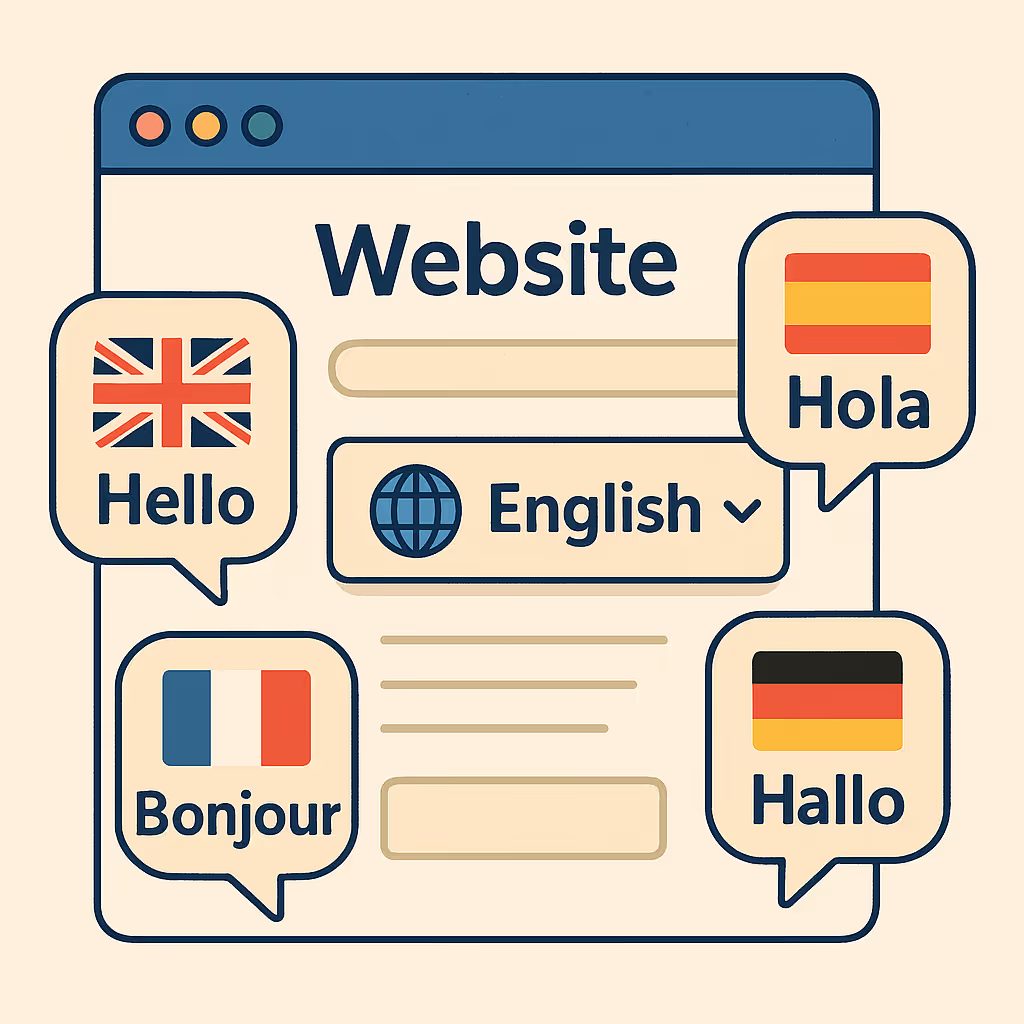
Moreover, these agencies often deploy advanced tools like translation memory (TM), term bases, and localization platforms that integrate directly into your CMS or product development pipeline. This ensures consistency, speed, and scalability—crucial for fast-moving fintech brands aiming to launch simultaneously in multiple markets.
Whether you're launching a new mobile banking app, expanding your crypto exchange, or rolling out multilingual customer support, partnering with a fintech translation agency helps you scale with confidence.
User experience is one of the most critical touchpoints in fintech. Fintech translation agencies specialize in adapting the interface of apps and platforms so users in any language feel like the product was designed just for them. This includes translating buttons, menus, tooltips, error messages, and onboarding flows while preserving the product's design and functionality.
The goal is not just linguistic accuracy but usability. Layouts need to adapt to right-to-left scripts, character expansion, and regional formatting standards for dates, currencies, and numbers. A fintech translation agency ensures that the entire experience feels seamless to a user, regardless of their location or language.
Financial technology operates in a tightly regulated space. Terms and conditions, privacy policies, KYC documents, and disclaimers must be translated with strict adherence to legal frameworks. A fintech translation agency employs subject-matter experts familiar with jurisdiction-specific legal terminology, ensuring that nothing is lost in translation.
These translations are not only accurate but compliant—meeting the requirements of regulators from the EU's GDPR to Japan’s FSA. This is a crucial area where even small errors can lead to fines, rejections, or reputational damage.
Marketing content in fintech carries a unique tone: it needs to be professional yet engaging, informative but not overwhelming. Translating this type of content requires a creative touch, especially when adapting it for culturally diverse audiences.
Fintech translation agencies provide transcreation services, where marketing copy is reimagined for new audiences rather than just translated. This includes social media posts, landing pages, PPC ad copy, video subtitles, and more—all adapted to resonate locally while maintaining brand voice.
To support this, many fintech teams turn to tools like FlexClip, which allow for the rapid creation and localization of high-quality marketing videos, including subtitles, voiceovers, and region-specific visuals.
Many fintech translation agencies also offer:
These services ensure that your entire customer journey—from first impression to daily interactions—is optimized for each target market.
Successful fintech localization begins long before the first word is translated. It starts with market research and language mapping—analyzing where your product will launch and how audiences in those regions consume financial services. This includes understanding the linguistic diversity, cultural sensitivities, tone of voice preferences, and regulatory requirements in each target market.
A fintech translation agency works closely with your team to define the languages that matter most, segment your audience, and determine which content needs to be adapted. This groundwork ensures that every element of your product or communication aligns with local expectations and legal standards.
Once the target regions and content scope are defined, the agency selects the appropriate linguists, often financial translators with experience in fintech. These experts don’t just translate—they adapt the content, ensuring that it reads naturally, avoids cultural faux pas, and maintains your brand identity.
In cases where literal translation doesn’t work—such as marketing taglines, user engagement emails, or educational resources—transcreation is used. This is the art of rewriting content creatively to evoke the same emotional and persuasive impact in the new language.
Before launching localized versions of your product, extensive testing is conducted. This includes linguistic QA to verify accuracy, style, and tone, as well as functional QA to ensure the content fits within the design elements of your app or website.
Agencies often simulate real-user experiences in the target markets to catch issues like text overflow, misaligned layouts, untranslated strings, or contextual errors. This meticulous testing phase helps maintain a consistent user experience across markets and prevents embarrassing missteps post-launch.
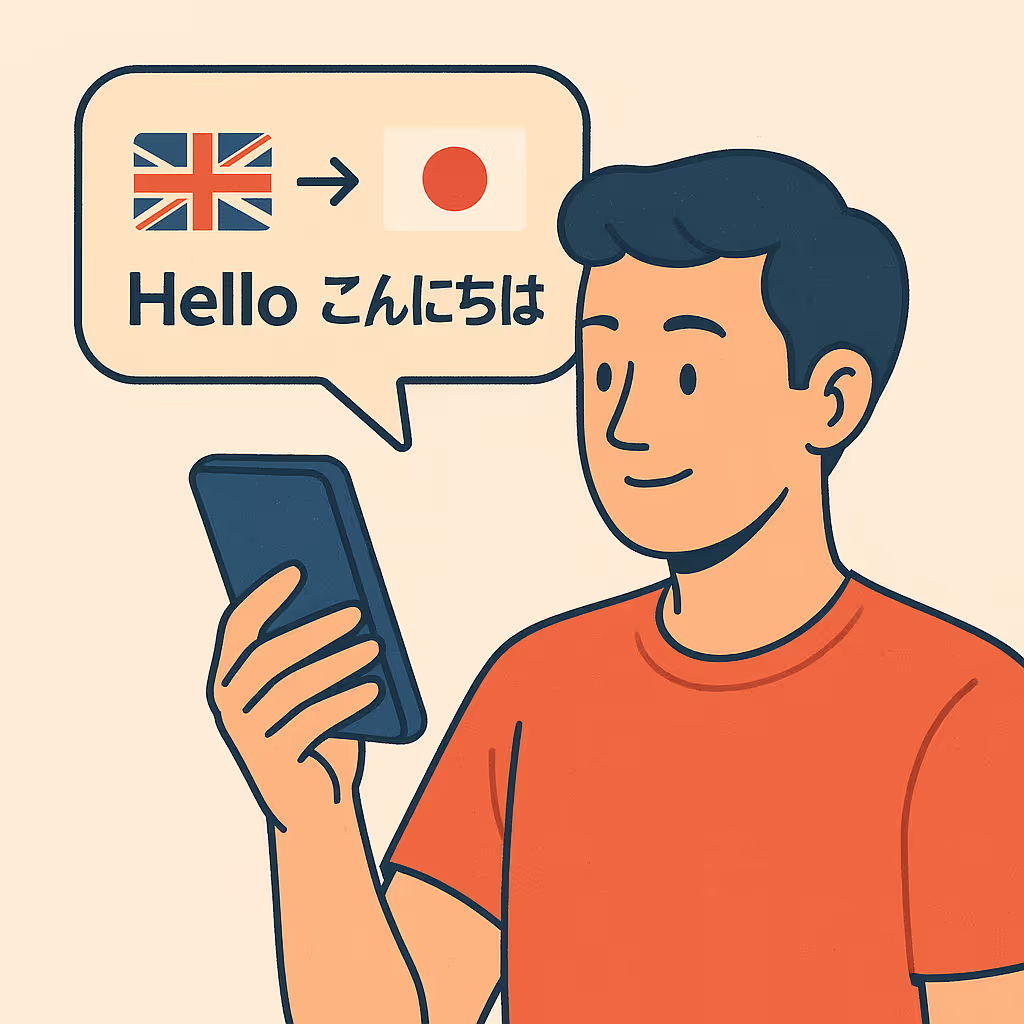
Fintech products evolve constantly, with new features, regulatory updates, and content being pushed out regularly. A fintech translation agency integrates into your agile development workflows, providing continuous localization services. This means new releases, updates, or marketing campaigns can be localized and launched across markets in parallel—without delay.
With tools like Translation Management Systems (TMS), APIs, and version control, content can be updated in real time, ensuring your fintech platform remains relevant, compliant, and engaging everywhere it operates.
In today’s fast-paced digital environment, speed and accuracy are paramount. Fintech companies demand rapid localization cycles without sacrificing quality. To meet these needs, translation agencies are leveraging the power of AI while retaining the indispensable role of human expertise.
This hybrid approach—where machines handle repetitive tasks and humans refine content for nuance and clarity—delivers efficient, scalable results. It’s particularly effective in fintech, where both volume and precision are critical.
Computer-Assisted Translation (CAT) tools form the foundation of modern localization. These platforms use translation memory to store and reuse previously translated content, ensuring consistency across similar projects and reducing time-to-market.
Natural Language Processing (NLP) adds another layer of sophistication. It analyzes sentence structures, identifies context, and improves machine output by learning from human corrections. As fintech terminology evolves, NLP models adapt, enabling more accurate translations of emerging financial terms.
Translation Management Systems (TMS) streamline workflows by managing projects, tracking edits, and integrating directly with content platforms. For fintech brands with frequent content updates—like transaction notifications, user prompts, or policy changes—a TMS ensures localized versions stay synchronized across all languages.
While AI tools offer speed and consistency, they cannot replace the judgment, cultural insight, and contextual understanding of human translators. In fintech, where tone, compliance, and financial accuracy matter, the margin for error is nonexistent.
Human linguists bring critical thinking to each translation task. They know when to preserve a legal phrase, when to adapt a metaphor, and how to localize humor or urgency. More importantly, they understand the implications of miscommunication in financial services.
This is why leading fintech translation agencies never fully automate. Instead, they use AI to enhance productivity while letting expert linguists handle decision-making. The result is a localization process that’s fast, scalable, and exceptionally reliable.
Before translating a single word, fintech companies need to identify where their product has the greatest potential. Language choices should not be made based on global popularity alone, but rather on alignment with business goals, market opportunity, and user behavior.
A fintech translation agency helps clients evaluate market data such as app usage trends, financial product adoption rates, and regulatory ease of entry to determine which languages to prioritize. For example, while English, Spanish, and Mandarin dominate globally, emerging markets like Indonesia, Vietnam, and Nigeria present high-growth opportunities for mobile-first fintech platforms.
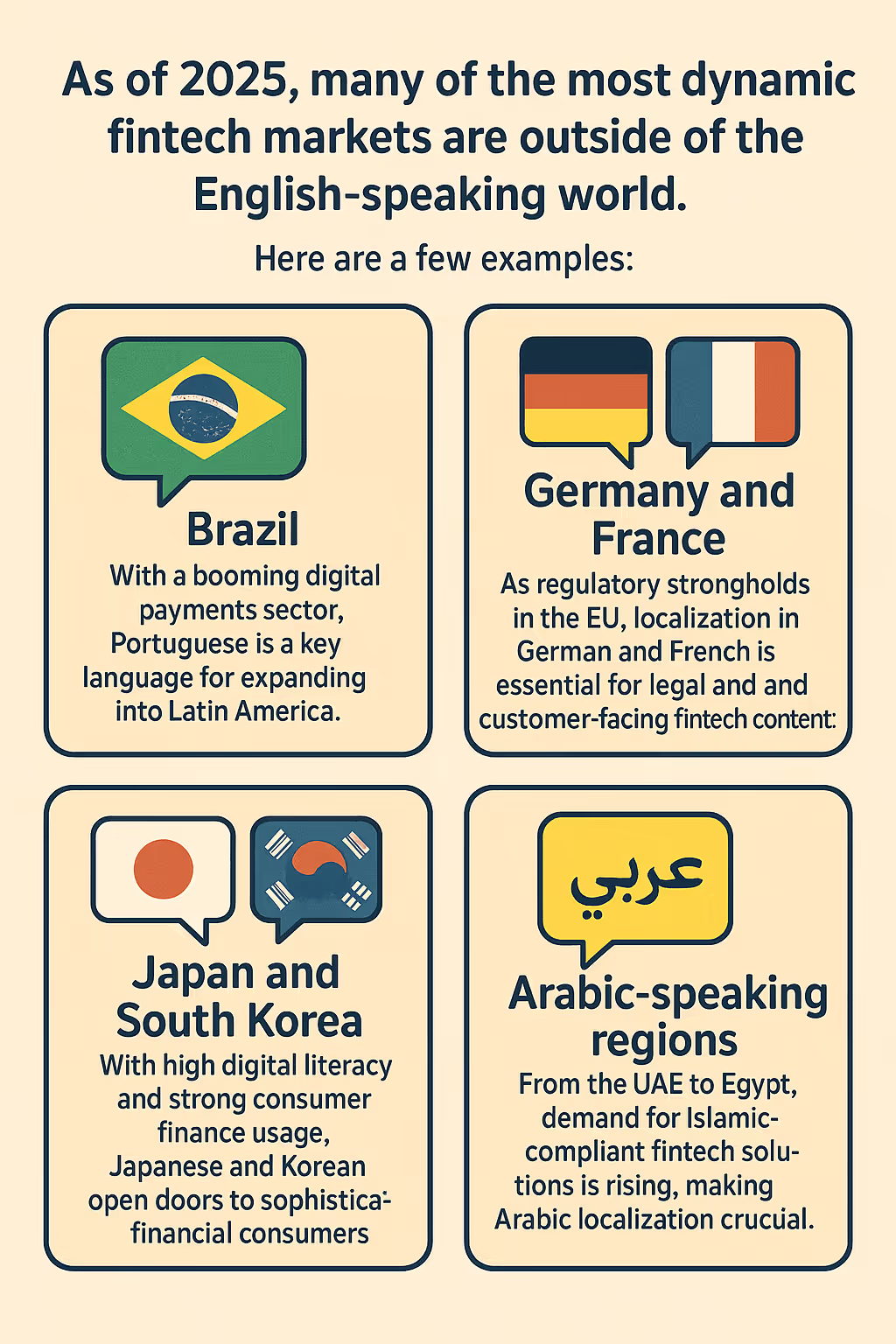
As of 2025, many of the most dynamic fintech markets are outside of the English-speaking world. Here are a few examples:
Choosing the right languages is about more than just population size. Cultural openness to digital finance, smartphone penetration, and trust in online platforms all play a role. It’s also important to assess the competitive landscape—if major players have already localized in a market, entering without localization is a serious disadvantage.
An experienced fintech translation agency provides guidance not only on which languages to prioritize, but also on how to enter those markets with culturally adapted, regulation-compliant messaging.
This strategic approach to language selection ensures that resources are invested where they will yield the highest return—boosting adoption, reducing churn, and accelerating brand loyalty in every new region.
In the world of fintech, accurate translation demands more than linguistic skill. It requires a deep understanding of financial systems, industry-specific terminology, and regional compliance. That’s where fintech-savvy translators come in.
Unlike general translators, these experts have experience working with complex financial products and understand how legal, technical, and user experience elements intersect. They’re familiar with terms like "APY," "PSD2 compliance," "tokenization," and "AML screening"—and know how these terms need to be localized based on jurisdiction and audience.
This expertise ensures that your message is not only linguistically accurate but also financially and legally precise.
In fintech, a small translation error can lead to major legal or financial consequences. Misrepresenting terms in a loan agreement, failing to convey tax implications accurately, or mistranslating KYC documentation could expose a company to regulatory risk.
Fintech translators trained in financial compliance are equipped to handle these high-stakes scenarios. They stay up-to-date with regulatory changes across markets, interpret legal frameworks correctly, and ensure that translated content meets the standards set by local authorities.
They also understand when to maintain certain terms in their original form—such as Latin-based legal terminology—or when a literal translation could confuse or mislead.
Another benefit of domain knowledge is consistency. Fintech platforms often include dozens of content types, from transactional emails to help center articles and in-app prompts. A fintech-savvy translator uses glossaries, style guides, and translation memory tools to maintain a consistent tone and terminology across every touchpoint.
This consistency is critical for building brand trust, particularly in industries where financial decisions depend on users’ understanding and confidence.
In short, domain-specific translation isn’t optional—it’s a safeguard against miscommunication, compliance failures, and lost opportunities in global markets.
Fintech companies entering new markets face an immediate and non-negotiable challenge: compliance. Each jurisdiction has its own rules governing data privacy, financial disclosures, anti-money laundering (AML), know-your-customer (KYC) policies, and more. Translating this content correctly isn’t just best practice—it’s legally required.
A fintech translation agency ensures that every piece of regulatory content is not only accurately translated but also aligned with the legal expectations of local authorities. Whether it's MiFID II in Europe, FSA regulations in Japan, or GDPR obligations across the EU, every clause must reflect the correct legal language.
A poorly translated legal document isn’t just confusing—it can be dangerous. Misstatements in terms and conditions, privacy notices, or user agreements could expose your company to lawsuits, fines, or regulatory scrutiny. This risk is particularly high in fintech, where user consent, identity verification, and financial security hinge on precise wording.
Professional fintech translators understand the weight of their work. They follow strict QA processes and collaborate with in-country legal experts to confirm compliance. In high-stakes sectors like payments, lending, and investing, there’s simply no room for ambiguity.
Compliance documents often use technical, formal language. However, the tone may vary by market. In some regions, users expect detailed legal explanations, while in others, a clear and simplified version of legal terms is preferred. A fintech translation agency strikes the right balance—ensuring the language is legally sound while also being user-friendly and accessible.
By offering translations that meet both user expectations and legal standards, agencies help fintech firms build transparency and trust from the outset.
Many regulators require proof of compliance, which includes demonstrating how translations were managed. Leading agencies provide detailed records, including translator qualifications, QA steps, version histories, and data security protocols. They are often ISO-certified, providing a verifiable chain of quality and accountability for each localized document.
This comprehensive approach to compliance translation allows fintech companies to scale with confidence, knowing their legal foundation is secure across every market they enter.
Grupo Santander’s digital brand Openbank launched its platform in Mexico in November 2024 to tap into the country’s rapidly growing digital banking segment. After testing its model in Spain, Germany, Portugal, and the Netherlands, Openbank entered the Mexican market with a fully localized website and mobile app—offering a 12.5% savings yield, zero-fee accounts, and 24/7 support in Spanish

Localization efforts included translating the entire user journey—onboarding flows, support messages, ATMs integration guidance, and compliance documents—while adapting design elements to support Spanish-language conventions and regional branding. The result was immediate engagement: strong user acquisition and trust backed by timely, culturally relevant communication.
In mid-2024, Spain’s BBVA announced plans to extend its successful digital banking model—launched in Italy in 2021—to Germany, targeting a full rollout in 2025. This move involved localizing UI, compliance documentation, customer communications, and backend workflows to meet German regulatory strictures and cultural preferences.
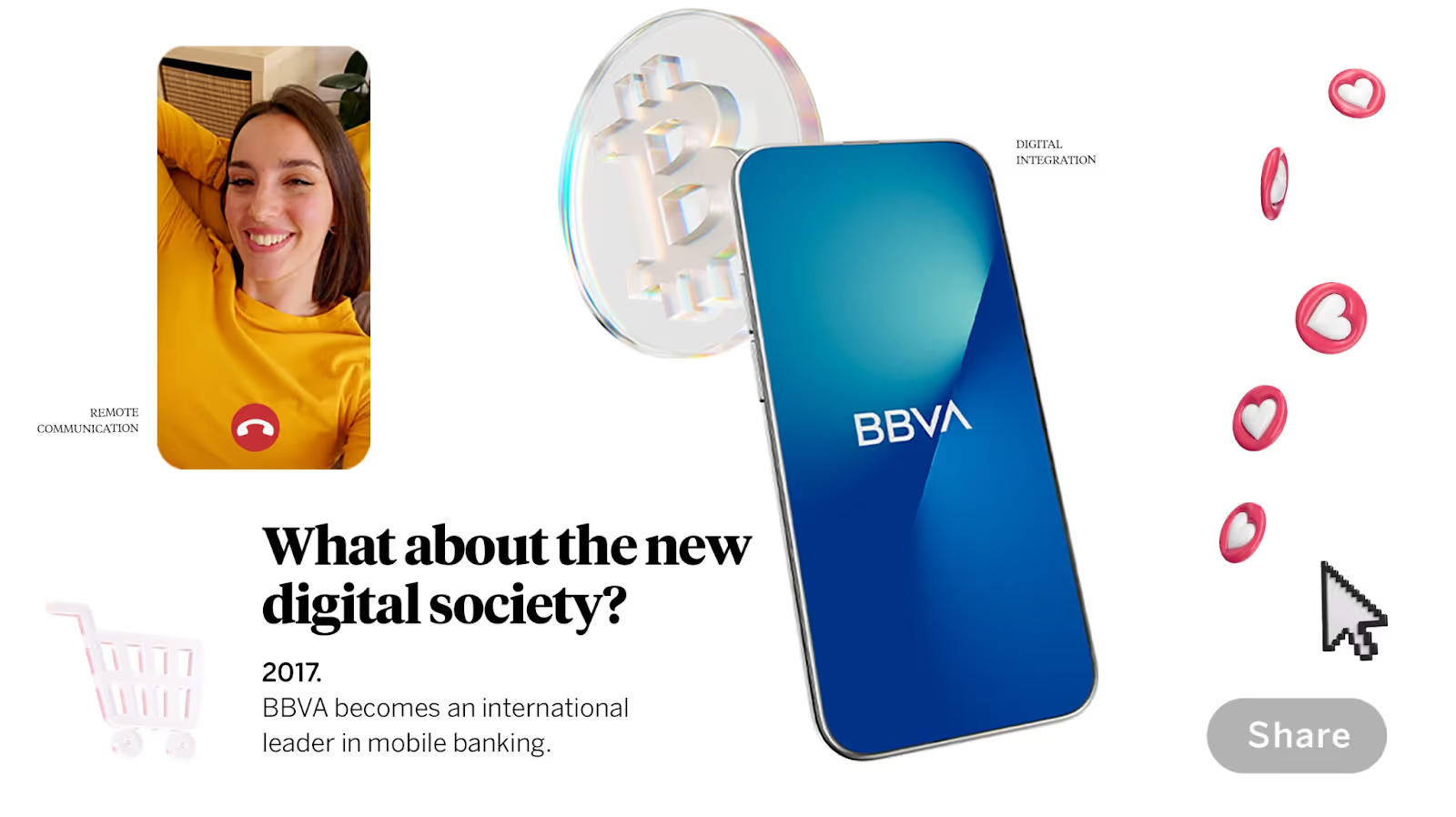
The localization strategy focused on adapting interface language, legal formatting, privacy notices, and support dialogs for German consumers. BBVA leveraged translation memory tools and glossaries to ensure consistent brand messaging across Italian, Spanish, and German versions, enabling a faster and more efficient go-live process—even amid complex EU banking regulations.
European neobank N26 faced rapid growth across multiple EU countries. To manage multilingual customer support, N26 implemented an AI-powered chatbot using Rasa, integrated into its web and mobile applications across five languages
Within a month, the bank launched the tool—translated and localized for key European languages—to handle common queries like “lost credit card” or “account balance.” This localization-first approach delivered a 20% reduction in live support volume and made the automated assistant feel as intuitive as conversing in one’s native language.
Insight
Description
Comprehensive Localization
Success hinges on translating beyond words—UI, legal docs, tone, and cultural nuance all matter.
Compliance Certainty
German and Mexican regulatory regimes demand precise legal and UI localization—accuracy is paramount.
Seamless Integration
Translation tech stacks (TM, TMS, APIs) can enable rapid, consistent rollouts across markets.
These case studies demonstrate how strategic fintech translation and localization can drive market entry, support compliance, and enhance customer experience—transforming global growth from ambition into reality.
Modern fintech companies operate in fast-paced environments. Product updates, security patches, new features, and regulatory changes occur frequently—and often across multiple markets at once. For localization to keep up, it must be agile, just like the product development process it supports.
Fintech translation agencies that understand agile workflows provide solutions that don’t slow down innovation. Instead, they embed into your development pipeline, enabling continuous localization through tools and processes designed for speed, accuracy, and collaboration.
One of the most effective ways to streamline localization is by integrating translation workflows directly into your content management systems (CMS), product information management (PIM) platforms, or code repositories.
Leading agencies offer API-driven solutions that allow content to be pushed and pulled automatically between your systems and their localization platforms. This reduces the manual effort involved in file transfers, eliminates delays, and ensures that every new release is ready for global audiences from day one.
Beyond integration, automation is the key to sustainable multilingual content delivery. Translation Management Systems (TMS) automate repetitive tasks like assigning linguists, tracking progress, managing versions, and applying translation memories.
These systems also support “pseudo-localization”—a technique used during QA to detect layout or character issues before the final translation is applied. By incorporating these workflows into agile sprints, fintech companies can launch new features in multiple languages simultaneously, without bottlenecks.
Agile localization isn’t just about tools—it’s also about teams. Translation agencies collaborate closely with product managers, developers, designers, and marketers to align localization efforts with product goals. Regular communication and shared tools help identify localization blockers early, keep projects on schedule, and maintain a consistent brand voice across all languages.
By treating localization as a product function—not an afterthought—fintech brands can scale more efficiently, reach users faster, and avoid the delays that come with last-minute translation.
The cost of fintech translation varies based on several factors: language pairs, content complexity, formatting needs, urgency, and volume. Translation agencies typically offer multiple pricing models to suit different business types:
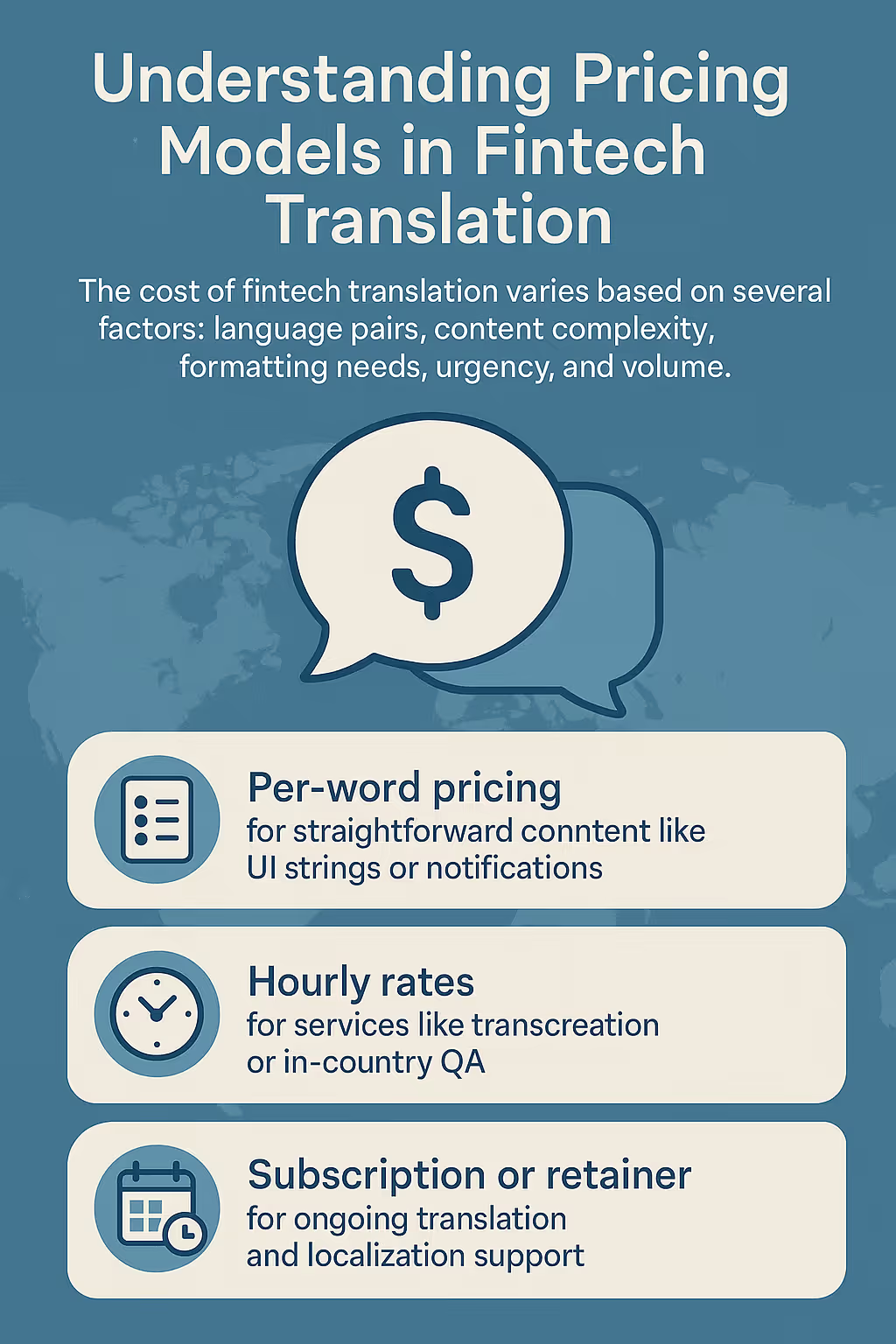
Agencies may also offer bundled services, which include translation, editing, proofreading (TEP), and project management under a single, predictable monthly fee. This allows fintech companies to better forecast localization costs as they scale.
Turnaround time depends on content type and complexity. While a simple batch of UI updates may be delivered in 24 to 48 hours, more complex projects like legal contracts or multi-language marketing campaigns could take several days to a week.
However, translation agencies with robust workflows and technology integrations can drastically reduce timelines. For example:
This means fintech companies can confidently plan global launches with tight deadlines.
Scalability is crucial for fintech businesses entering new regions quickly. A fintech translation agency offers scalable infrastructure—cloud-based platforms, global linguist networks, and dedicated project managers—to handle rising content demands without compromising quality.
This becomes particularly important for businesses with cyclical or spiky workloads, such as:
Agencies that specialize in fintech are built to absorb this scale and offer elastic resourcing—so your localization capabilities grow alongside your business, not behind it.
By aligning cost, speed, and scalability, fintech translation partners make global expansion smoother, faster, and more sustainable.
In financial services, consistency isn't just about branding—it's a core requirement for user trust, legal clarity, and platform usability. When terminology changes between a help article, an app screen, and a legal disclaimer, it can confuse users and raise doubts about the reliability of the service.
A fintech translation agency mitigates this risk by applying structured quality assurance practices and using tools that enforce consistency across all translated content types.
One of the foundational tools used to maintain consistency is a terminology glossary. This centralized resource defines key terms and approved translations for everything from financial concepts to brand-specific language. It ensures that “APR” or “crypto wallet” is always translated the same way across languages and contexts.
Glossaries are created in collaboration with clients and are especially valuable when working in regulated environments where legal terminology must remain exact.
Translation memory (TM) is another essential asset. It stores previously translated segments—sentences, phrases, and paragraphs—and suggests matches during new translation projects. This not only speeds up the localization process but also guarantees consistency, even as your content library expands.
In fintech, where documentation and product language often repeat across different touchpoints, TM drastically improves both cost-efficiency and linguistic accuracy.
Top-tier fintech translation agencies implement multi-step QA workflows. These often include:
This layered approach ensures that translations meet both linguistic and functional standards—critical in fintech, where errors can impact user experience or trigger compliance issues.
Finally, quality includes tone and brand identity. An effective localization strategy ensures that your fintech brand sounds confident, trustworthy, and helpful in every language—whether users are reading an onboarding message in Polish or a fraud alert in Arabic.
Agencies work with creative linguists who can adapt your voice for local audiences while preserving your global brand essence.

Startups often delay professional translation until they’re ready to scale. But in fintech, the earlier you bring in a specialized agency, the better. Even if you’re still iterating on your MVP or testing product-market fit in one region, early localization planning helps future-proof your infrastructure.
A fintech translation agency can guide early-stage companies on how to structure content for easier translation later, set up scalable workflows, and avoid costly rewrites. For growth-stage companies, the decision becomes even more critical. Expanding into new markets without professional localization can lead to user confusion, regulatory missteps, and brand inconsistency.
There are specific moments when a fintech business should strongly consider partnering with a translation agency:
If any of these align with your roadmap, waiting too long could result in operational bottlenecks or missed market opportunities.
Some fintech teams try to manage translations in-house or rely on generic services. Over time, the limitations become clear:
These signs point to a lack of infrastructure that can only be solved through a dedicated fintech localization partner.
Partnering with a fintech translation agency isn’t just about solving a short-term language need—it’s about building a long-term growth engine. The agency becomes an extension of your team, providing ongoing support, improving translation memory, refining style guides, and evolving workflows with your product.
This collaborative relationship gives you the confidence to launch new features, markets, and content at scale—without compromising quality, speed, or user trust.
In a market as dynamic and trust-sensitive as fintech, localization isn’t a luxury—it’s a strategic necessity. A fintech translation agency does more than bridge languages; it helps you connect with users, meet regulatory demands, and build lasting brand credibility in every market you enter.
Whether you're launching in new regions, updating compliance documents, or scaling your product experience, expert translation ensures you're not just heard—but understood. Investing in precise, culturally fluent localization is one of the smartest moves a fintech brand can make in 2025 and beyond.
It depends on your expansion goals. For European fintechs, German, French, and Spanish are essential. In Asia, Mandarin, Japanese, Korean, and Hindi are common targets. For Middle Eastern or African expansion, Arabic and Swahili are frequently prioritized. A fintech translation agency can help assess language needs based on regulatory requirements, user demographics, and market potential.
Pricing typically varies by content type, language pair, volume, complexity, and turnaround time. Most agencies offer per-word rates for standard translation and hourly rates for services like editing or transcreation. Long-term clients may benefit from subscription-based pricing or project bundles.
Yes. Leading fintech translation agencies offer integrations with content management systems, app frameworks, customer service platforms, and code repositories. This allows for real-time syncing, automated updates, and seamless localization within agile workflows.
Turnaround times vary. Short content like UI strings or notifications may be ready within 24–48 hours, while longer legal or marketing documents can take several days. Agencies with robust translation management systems and linguist networks often deliver quicker without compromising quality.
Most agencies offer rush services or prioritize urgent requests for clients with ongoing relationships. They can quickly allocate resources for compliance deadlines, emergency updates, or last-minute content changes, especially if you’ve already built translation memory with them.
Yes. Specialized fintech translation agencies work with legal translators and regulatory experts to ensure that localized documents meet jurisdiction-specific legal requirements. Many are also ISO-certified, offering audit trails and validation documents if required.
Start by identifying your content priorities—whether it's legal, technical, marketing, or customer-facing—and your target markets. Then, partner with a trusted translation agency that understands fintech inside and out.
If you're ready to scale your fintech product globally and want the accuracy, trust, and market adaptability only professional localization can offer—Ballistic Design Studio is ready to help. Our team combines creative strategy with deep fintech experience to ensure your message is clear, compliant, and effective in any language.

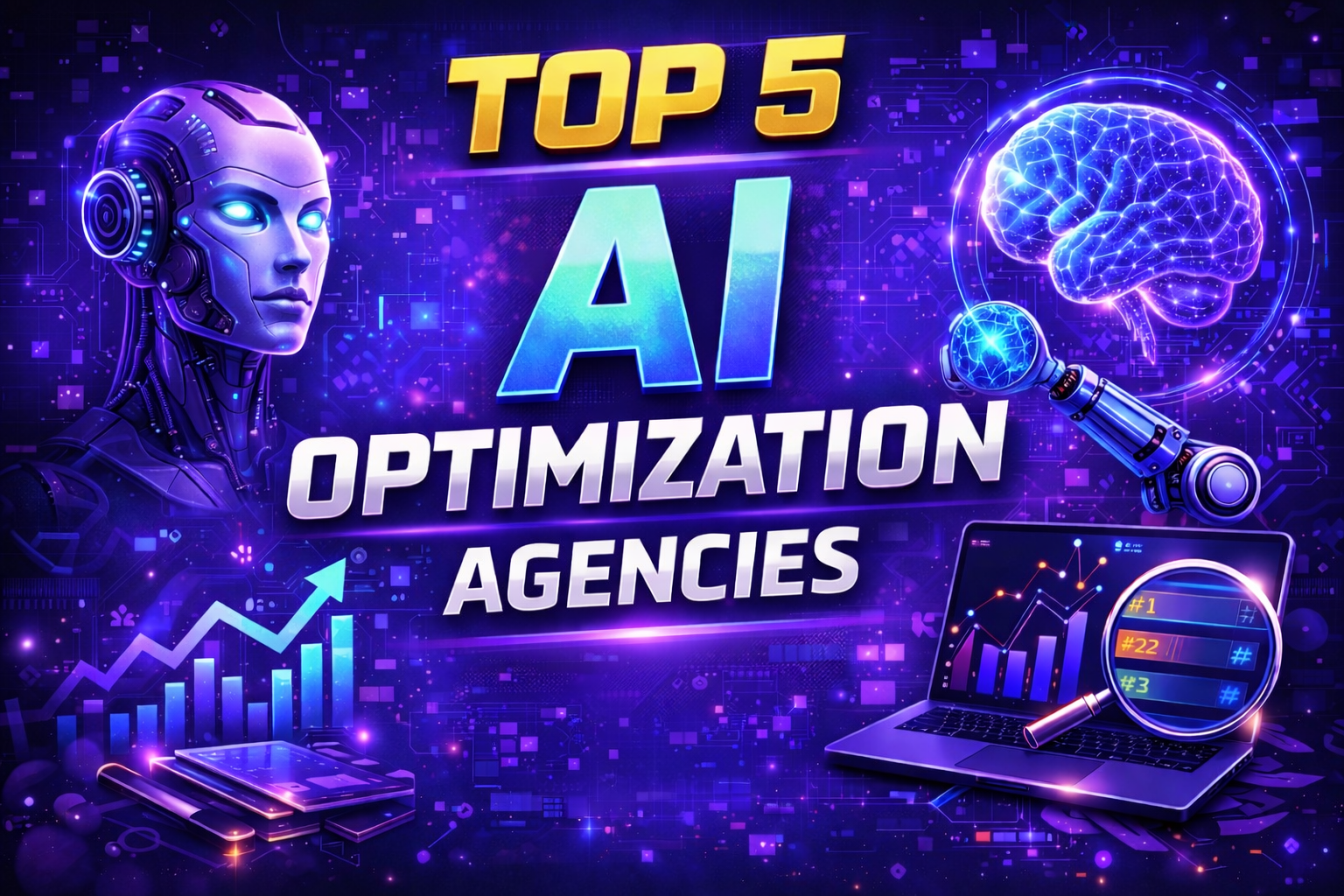

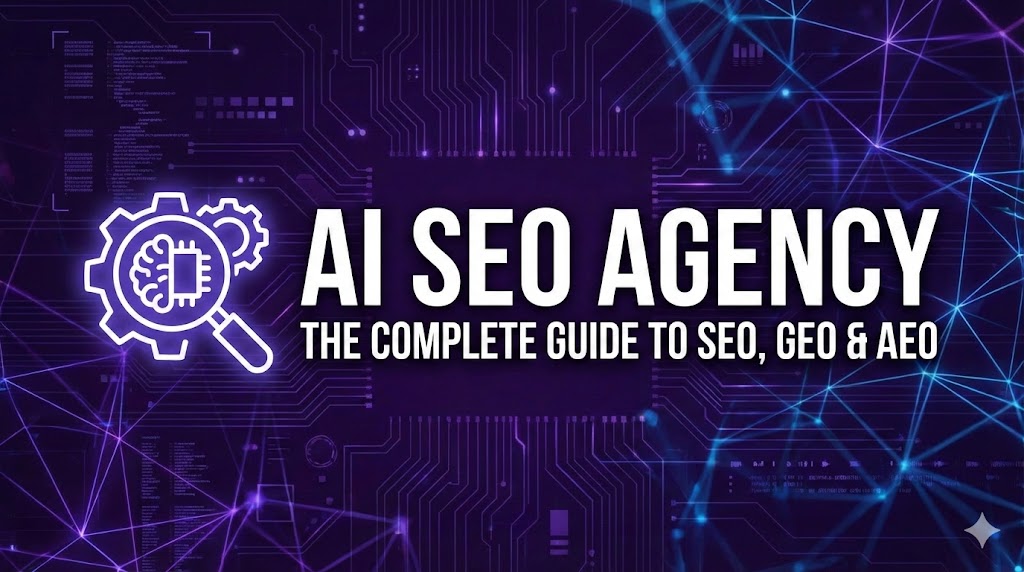
Wait, don't go! 100% Free - Unlimited Webflow Development for 7 days.
Only valid for-